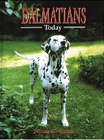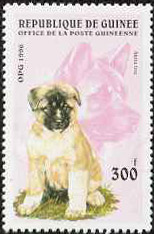
Dalmations Today: Book of the Breed
Dalmations are delightful dogs for people who have the energy to keep up with them, and who are skilled at training. They are sensitive, and can switch off if trained too roughly, but can also be motivated by their desire to play. They are very active dogs, which take a while to mature, so they can be too boisterous for some children. Boisterous Dalmations have been known to knock over adults, just by giving a friendly greeting.
Exercise is important, since Dalmations that don't get to run around enough can become overactive, destructive in the home, and generally difficult to live with. Dalmations aren't dogs to leave alone for long periods. They also need training from puppyhood, especially in learning not to jump up, and they don't take to training as easily as, say, Labrador Retrievers, but do learn, so long as their owners are persistent. Well-trained Dalmations are good companions for children, though they are a bit strong and lively for children to take out for walks, and tend to be too lively indoors for small children.
Some Dalmations can be dog-aggressive, and entire males may get into spats with other entire males they meet on walks, but generally Dalmations get on well with other dogs, so long as they are carefully socialized. They are good watchdogs, giving serious barks to alert their owners, but not usually over-barky. They are usually sociable with visitors, so aren't good guard dogs. Dalmations shed a fair amount, and the short hairs can be difficult to dislodge from clothes. They don't usually have a strong doggy smell, so long as they get out enough.
Dalmations can suffer from cold in winter, and may benefit from a coat. Common health problems include inherited deafness, food allergies showing as skin disorders, and high levels of uric acid leading to urinary stones. They should not be fed pulses, especially lentils, or offal, nor should they be given aspirin. It's especially important that Dalmations always have access to water, and kibble should be soaked rather than given dry.
This Book of the Breed was written by Patches Silverstone, who has been involved in Dalmations since 1971, and was on the Committee of the British Dalmatian Club (BDC) for nearly 20 years. The book looks at the origins of the Dalmatian, and its role as companion and show dog. There's help with choosing and caring for a new puppy, including training and socialisation. The book also covers exercise and nutrition. There is useful information on breeding and genetics, with a particular focus on deafness, a condition associated with Dalmatians. Dalmation lovers will drool over the illustrations.



